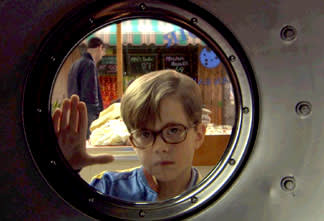In the opening scene of Robert Lepage's stunning new film we learn that the moon's regarded as a "polished mirror, its dark scars and mysterious contours reflections of our own mountains and seas." Its other side the far side has spent its lifetime away from human eyes, deeply scarred by celestial debris that pummelled it for a lifetime.
If there is much to ponder in this potent image then it is lucky for us that the iconoclastic Quebecois director has symbolically turned towards it in The Far Side of the Moon, an adaptation of his stage play of the same name. His unorthodox view and stunning visual approach serve as the perfect vehicle, guiding us in a most entertaining fashion towards what lies beyond the great unknown.
In this film nothing can exist without its opposite. Light and dark, past and present, smart and dumb, lucky and unlucky are forever at odds. Yet, LePage is so in charge of his material, so sure of his theme of duality that he manages in his own quirky way to build the perfect symmetry. It makes sense, then, to have him play both title roles: Phillippe, the witty but deeply unhappy PhD candidate coping with the recent loss of his mother (Anne-Marie Cadieux) and his brother, Andre, a foppish TV weatherman whose mantra is ironically, "I speak loud and I'm not ridiculous." Phillippe is desperately trying to reach out to his estranged brother but their relationship is fraught with difficulty, a reality made none the easier by Andre's ability to attain everything he wants in life.
When not toiling away at his thesis and its argument that space travel is an extension of mankind's inherent narcissism, he's pondering the cosmos in the way that most people spend dissecting an episode of the X-Files looking for clues in ordinary places, probing the cosmos for answers. LePage has made Phillippe's quest for depth the centrepiece of his film, but the departure for him is that he has injected it with equal doses of humour and pathos, which is a departure in a career marked by heavy fare. "How," he wonders, "do you balance the infinitely banal with the infinitely essential?" Like a walk on the moon, it is a delicate balance of gravity and levity. (Alliance Atlantis)
If there is much to ponder in this potent image then it is lucky for us that the iconoclastic Quebecois director has symbolically turned towards it in The Far Side of the Moon, an adaptation of his stage play of the same name. His unorthodox view and stunning visual approach serve as the perfect vehicle, guiding us in a most entertaining fashion towards what lies beyond the great unknown.
In this film nothing can exist without its opposite. Light and dark, past and present, smart and dumb, lucky and unlucky are forever at odds. Yet, LePage is so in charge of his material, so sure of his theme of duality that he manages in his own quirky way to build the perfect symmetry. It makes sense, then, to have him play both title roles: Phillippe, the witty but deeply unhappy PhD candidate coping with the recent loss of his mother (Anne-Marie Cadieux) and his brother, Andre, a foppish TV weatherman whose mantra is ironically, "I speak loud and I'm not ridiculous." Phillippe is desperately trying to reach out to his estranged brother but their relationship is fraught with difficulty, a reality made none the easier by Andre's ability to attain everything he wants in life.
When not toiling away at his thesis and its argument that space travel is an extension of mankind's inherent narcissism, he's pondering the cosmos in the way that most people spend dissecting an episode of the X-Files looking for clues in ordinary places, probing the cosmos for answers. LePage has made Phillippe's quest for depth the centrepiece of his film, but the departure for him is that he has injected it with equal doses of humour and pathos, which is a departure in a career marked by heavy fare. "How," he wonders, "do you balance the infinitely banal with the infinitely essential?" Like a walk on the moon, it is a delicate balance of gravity and levity. (Alliance Atlantis)
